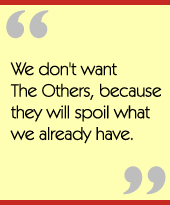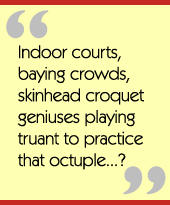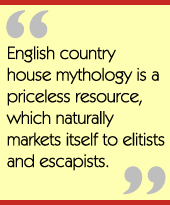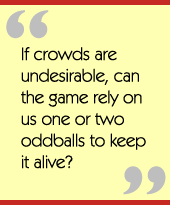

|
Back to |
| The Front Page |
| Letters & Opinion |
|
'The Others': image and elitism in croquet
|
|||||||||
|
by Michael Wilson reprinted by permission of the author and the Croquet Gazette layout by Reuben Edwards Posted February 7, 2004
|
|
||||||||
Michael Wilson was attracted to the game of croquet at Oxford University when he was getting his doctorate there a decade ago. Despite juggling married life, fatherhood and career, he has managed, at the tender age of 35, to get his handicap down to 3 1/2 at his home club in Sussex County, UK. That doesn't include painting, writing, and playing musical instruments. He is, in his words, "a lone arts buff in a sport dominated by creatures from the science labs." Perhaps it is his "elite" status within a club of mostly older people that sharpens his observations on image and elitism in croquet and gives them the global scope that attracted us when we first read them in the March 2003 issue of England's Croquet Gazette.
If we haven't actually heard the conversations then we can imagine them:
‘What's needed is new members.’
‘Young people, that's what the game needs.’
‘More youngsters playing our game.’
‘Yes, of course,’ says the longstanding club chairman, who's voted himself a
parking space and a bench plaque. ‘But then, we need the right sort of
youngsters.’
‘Oh, yes. We need the right sort of youngsters.’
‘Youngsters who don't drink so much.’
‘Who'll join us at teatime for a chat.’
‘Who won't be too intense about the game.’
‘The neat and tidy sort of youngster.’
‘One who doesn't swear and who wears proper clothes.’
Before long, we wonder if new youngsters are wanted at all. Perhaps what is really wanted is old youngsters, a rejuvenation of the club's current membership. This is not a call for new blood, but rather a keening for some narrow criterion of membership which is no longer practicable. Change, oh my God - imagine it!
Committees are the same in all walks of life, from sewing circles to local government. A vigorously waved banner of progress can't hide a group of friends who want to preside over their own kingdom without the threat of change. But in croquet especially, we have a paradox which extends beyond the club committees. This paradox centres on The Others. Other people, new people, outsiders. We want them, because we see the many benefits which sports can gain from popularity. Yet we don't want them, because they will undoubtedly spoil what we already have.

Whatever we say about croquet's aura, there are clear reasons why people do and don't join croquet clubs and for most of them it has little to do with whether or not hitting balls with a mallet is enjoyable in itself. Croquet clubs have a powerful image in the ignorant conscious, an image that would be difficult to shake off in any circumstances. And shaking that image off is impossible given the simple fact that no-one in the game really wants to lose it at all.
No, for all the moaning about development and the token marketing that goes on, we don't want anything to change at all. Not really.
Let's face it, most of us are in croquet because we were drawn to its very image - not the stale archetype of pensioners' pat-ball, which we'd love the media to dispel for us, but a more appealing image. Croquet, as we're tired of explaining to the uninitiated, is unfathomably skilful. Nevertheless, croquet as it is played today has an image which attracts the majority of its followers, and that image is one of exclusivity. It is an elitist's sport.
Croquet is not elitist because it is a snob's game, or a rich person's game, or a difficult game to learn. Indeed, at least one of these is untrue. In essence, though, it is elite simply because it is unusual. People choose to play it because they would rather take a road less travelled.

We should recognise, for example, that those young people who choose to play the sport are making a daring statement. They don't want to join in the activities of the common herd. They want something more exclusive, more mysterious, an esoteric pursuit with something other-worldly about it. Something different. And we can guess why. An exclusive pursuit allows the individual to shine more brightly. A sparsely populated pursuit allows an amount of crony-ism, the pleasures of recognition and a close-knit community that know who's in and who's outside: who 'we' are and who represent 'The Others'. Croquet's other-worldliness also fuels a certain escapism which is barely quashed by the practical rigours of hard, skilful competition.
Contrast snooker's aficionados, a set who have followed the crowds and hugged to the popularising output of the TV. Anyone who has been to a snooker club recently will find that the gentlemen after-dinner billiards players are conspicuously absent. Gone too are the seekers of an ‘alternative’ pastime. Times they have a-changed. I remember my Tiger Book of Sport, circa 1974, had snooker on a page with other ‘seldom-seen sports’ (there was no reference to croquet, weltering presumably with the ‘never-seen sports’). Anybody surfing their TV channels during the 1980s, however, would’ve been lucky to catch a snooker-free hour. Snooker’s dominating group is consequently the mass of urban youth, with its contemporary manner and occasionally astonishing talent.
No apologies for comparing the two games. They have become opposite extremes in some ways, yet they require similar skills and offer not dissimilar satisfactions: they were once played in the same atmosphere by the same people. What happened to snooker? Will the same happen to croquet? Is that what croquet wants?
Indoor courts, baying crowds, skinhead croquet geniuses playing truant in order to practice that octuple… it’s a far cry from the current game, but isn’t it equally valid? Isn’t it even quite possible? We’re just waiting for the Alex Higgins of croquet to spring up out of the Cheltenham ghettos, or a Ronnie O’Sullivan figure to drag his fans to Budleigh.

And of course such change - heaven forbid - would see the top levels of the game soar beyond recognition. We know how standards suffer in games which are dedicatedly middle-class. Finding genuine high-flyers needs a large pool of participants. Look at the standard of football in countries with a large population of urban poor. Okay, you can’t play croquet in a back-alley with a tin can, but the point is still there. We know that cricket, for one, has suffered irreparably from post-war decline in interest among the urban working population.
So, what croquet needs is talented individuals from the broadest demographic possible. Is this a likely change in croquet? Interested groups from a similarly broad demographic - what about that? Fans bawling from the sidelines mid-break - ‘Go on Reg, wellie it, mate!’ - kids in jeans giving the old guard a pasting…visible antagonism, air-punching elation… ‘Give ‘im a kicking, Rob!’ Do we want it, Yea or Nay?
I bet the Nays take it by a landslide. And most of the voters will be quite happy to denounce out loud any such heretical proposals. ‘Let’s keep our sport for the elite who appreciate it’

In which case, where do the new members come from?
Of course it is nice to support the preservationist slant. We all basically like croquet the way it is or we wouldn’t be involved in it now. The atmosphere which surrounds it is, for one thing, unutterably beautiful. Even the ‘radical’ Palm Beach project has used Hurlingham as a template for its design. Teas, parkland, blue-skies and whites - for anyone with a fondness for the picture created by English country house mythology, croquet has a charm rivalled only by village cricket. Indeed, this image is a priceless resource, one which naturally markets itself to elitists and escapists.
Part of croquet’s whole attraction is that it is currently played in a world removed from mainstream twenty-first-century life. We shouldn’t be surprised that The Others don’t appreciate the intricacies of a pastime they see from over a barbed-wire fence nor that they will muddy the carpets when they’re invited in. What we have in croquet is a little enclave where populist existence, with its watered-down street cultures, crowds and hubbub, is banished. And when we say yes to lovely new fee-paying members, we expect them to wipe their feet clean and kowtow to our neatly preserved Eden in its entirety. ‘They can join, but only if they do things our way.’
With new members change is inevitable though, especially if they arrive en masse. New members, young members, however much they are drawn by croquet’s current state and some of its surrounding myths, are bringing changes all the time, with new styles in everything from t-shirts to roquets.

It is a sad yet classic problem - ‘I know my kingdom is collapsing but the only way of preserving it is by changing it beyond recognition - by making it somehow no longer mine.’ People who cry out for more members generally want subservients, an influx of numbers and money but with no force for change. Hence the little committee drama imagined above.
What, then, do we want? How do we encourage more people to join and at the same time preserve the game’s pleasant exclusivities? What should change and by how much? What will the new generation bring? If crowds are undesirable, then can the game really rely on us one or two oddballs to keep it alive?

Compromise is of course possible, and we should hope nothing that is great about croquet will be lost, and this includes a large part of its current image: its ‘other-worldliness’ and, in a good sense, its ‘elitism’ - its location down the road less travelled by. We must also hope that any changes prove to be positive ones.
But one thing is sure: where large groups of people are concerned we have very little control, and which of The Others do eventually come into croquet, and how they affect it, will be decided not by ‘us’ but by ‘them.’